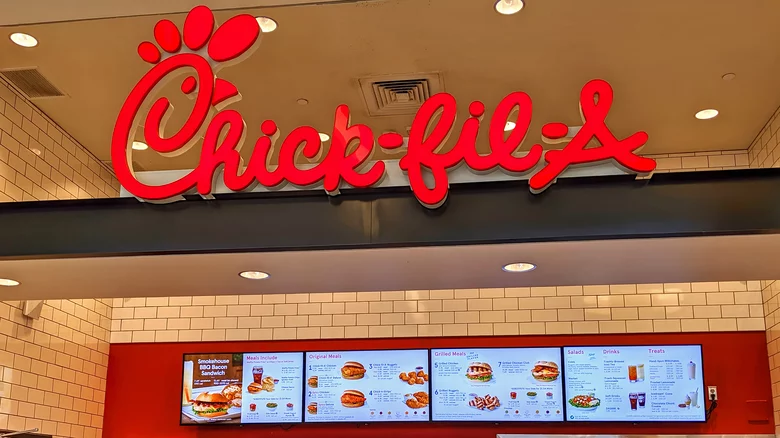In a world where businesses come and go with astonishing rapidity, the tale of Chick-fil-A’s original location shutting its doors is a poignant reminder of the impermanence of beginnings and the relentless march of progress.
As we ponder over this event, it’s an opportune moment to reflect on the journey of a business, from its humble origins to its peak of success, and sometimes, the inevitable need to let go of the past.
Imagine your business achieving monumental success, becoming a household name with a loyal customer base, and even stirring up a few detractors along the way. It’s a dream many entrepreneurs chase relentlessly.
However, what happens when your business grows to a point where its beginnings become a distant memory, known only to a few? This is the story of Chick-fil-A, a company that has grown from a small outlet in Atlanta’s Greenbriar Mall to a fast-food giant, yet now faces the closure of its original store.
In a world where businesses come and go with astonishing rapidity, the tale of Chick-fil-A’s original location shutting its doors is a poignant reminder of the impermanence of beginnings and the relentless march of progress.
As we ponder over this event, it’s an opportune moment to reflect on the journey of a business, from its humble origins to its peak of success, and sometimes, the inevitable need to let go of the past.
Imagine your business achieving monumental success, becoming a household name with a loyal customer base, and even stirring up a few detractors along the way. It’s a dream many entrepreneurs chase relentlessly.
However, what happens when your business grows to a point where its beginnings become a distant memory, known only to a few? This is the story of Chick-fil-A, a company that has grown from a small outlet in Atlanta’s Greenbriar Mall to a fast-food giant, yet now faces the closure of its original store.
Founded in 1967 by Truett Cathy, Chick-fil-A’s first location was a groundbreaking concept. It was not just a pioneer in the modern-day food court, but also a trailblazer in the fast-food industry. As noted on Chick-fil-A’s website, this 384-square-foot restaurant, no larger than a two-car garage, marked the beginning of what would become a nationwide phenomenon.
The original Chick-fil-A location holds a special place in the company’s history, symbolizing innovation and the birth of a brand that would eventually expand to serve customers across 47 states and Washington, D.C.
The reason behind the closure of Chick-fil-A’s inaugural location is emblematic of the changes sweeping through retail and consumer habits. Reports indicate that the decline in foot traffic at Greenbriar Mall, attributed to the loss of anchor tenants, has made it challenging to sustain the restaurant.
This trend is reflective of a broader shift in consumer behavior, with traditional shopping malls facing declining footfalls as online shopping gains prominence.
The closure of Chick-fil-A’s first location is not just about the end of a physical space. It represents the evolution of a brand and the bittersweet reality of growth and change.
Each business, in its journey towards success, often outgrows its origins. This transition, while a sign of progress, can also be a moment of reflection on the roots and values that laid the foundation for future achievements.
Interestingly, Chick-fil-A is not alone in this journey. Other iconic brands like Starbucks, Dunkin (formerly Dunkin Donuts), McDonald’s, and KFC have also navigated similar paths. While some of their original locations have become museums or maintained as historic sites, others have adapted or closed in response to changing times and consumer needs.
The original Starbucks in Seattle, Dunkin’s first store in Massachusetts, and one of the earliest McDonald’s in California are examples of how these brands have preserved their heritage. In contrast, Chick-fil-A’s decision underscores the reality that not all beginnings can be physically preserved.
This narrative around Chick-fil-A’s original store closure serves as a profound lesson for entrepreneurs and business leaders. It’s a reminder of the importance of remembering and honoring one’s origins while embracing growth and change.
As businesses evolve, it’s crucial to maintain a connection to the foundational values and experiences that shaped their early days, even as they adapt to new realities and challenges.
In a world where businesses come and go with astonishing rapidity, the tale of Chick-fil-A’s original location shutting its doors is a poignant reminder of the impermanence of beginnings and the relentless march of progress.
As we ponder over this event, it’s an opportune moment to reflect on the journey of a business, from its humble origins to its peak of success, and sometimes, the inevitable need to let go of the past.
Imagine your business achieving monumental success, becoming a household name with a loyal customer base, and even stirring up a few detractors along the way. It’s a dream many entrepreneurs chase relentlessly.
However, what happens when your business grows to a point where its beginnings become a distant memory, known only to a few? This is the story of Chick-fil-A, a company that has grown from a small outlet in Atlanta’s Greenbriar Mall to a fast-food giant, yet now faces the closure of its original store.
Founded in 1967 by Truett Cathy, Chick-fil-A’s first location was a groundbreaking concept. It was not just a pioneer in the modern-day food court, but also a trailblazer in the fast-food industry. As noted on Chick-fil-A’s website, this 384-square-foot restaurant, no larger than a two-car garage, marked the beginning of what would become a nationwide phenomenon.
The original Chick-fil-A location holds a special place in the company’s history, symbolizing innovation and the birth of a brand that would eventually expand to serve customers across 47 states and Washington, D.C.
The reason behind the closure of Chick-fil-A’s inaugural location is emblematic of the changes sweeping through retail and consumer habits. Reports indicate that the decline in foot traffic at Greenbriar Mall, attributed to the loss of anchor tenants, has made it challenging to sustain the restaurant.
This trend is reflective of a broader shift in consumer behavior, with traditional shopping malls facing declining footfalls as online shopping gains prominence.
The closure of Chick-fil-A’s first location is not just about the end of a physical space. It represents the evolution of a brand and the bittersweet reality of growth and change.
Each business, in its journey towards success, often outgrows its origins. This transition, while a sign of progress, can also be a moment of reflection on the roots and values that laid the foundation for future achievements.
Interestingly, Chick-fil-A is not alone in this journey. Other iconic brands like Starbucks, Dunkin (formerly Dunkin Donuts), McDonald’s, and KFC have also navigated similar paths. While some of their original locations have become museums or maintained as historic sites, others have adapted or closed in response to changing times and consumer needs.
The original Starbucks in Seattle, Dunkin’s first store in Massachusetts, and one of the earliest McDonald’s in California are examples of how these brands have preserved their heritage. In contrast, Chick-fil-A’s decision underscores the reality that not all beginnings can be physically preserved.
This narrative around Chick-fil-A’s original store closure serves as a profound lesson for entrepreneurs and business leaders. It’s a reminder of the importance of remembering and honoring one’s origins while embracing growth and change.
As businesses evolve, it’s crucial to maintain a connection to the foundational values and experiences that shaped their early days, even as they adapt to new realities and challenges.
As we look at Chick-fil-A’s journey, it’s a call to appreciate the significance of beginnings, no matter how modest. For entrepreneurs and business owners, it’s a reminder to cherish the early days of struggle and triumph, and to carry forward the lessons learned. It’s also a prompt to recognize the inevitability of change in the business landscape and to adapt with resilience and foresight.
The closure of Chick-fil-A’s first location is more than just the end of an era; it’s a testament to the dynamic nature of business and the continuous cycle of renewal and growth. It’s a story that resonates with every entrepreneur who has dared to dream and has worked tirelessly to turn those dreams into reality.
As we bid farewell to the original Chick-fil-A, we acknowledge the relentless spirit of innovation and the enduring legacy of beginnings, no matter how distant they may become.

James Anderson is a seasoned journalist and the primary author of many articles on usaunfiltered24.com. With a keen eye for current events and trends, James has built a reputation for delivering timely, insightful content on a wide range of topics, from breaking news to popular culture. His ability to simplify complex issues and present them in an engaging way has made him one of the go-to writers for readers seeking reliable information. With years of experience in the media industry, James is known for his thorough research and commitment to providing readers with accurate and up-to-date news, making him a trusted voice in the world of journalism.


